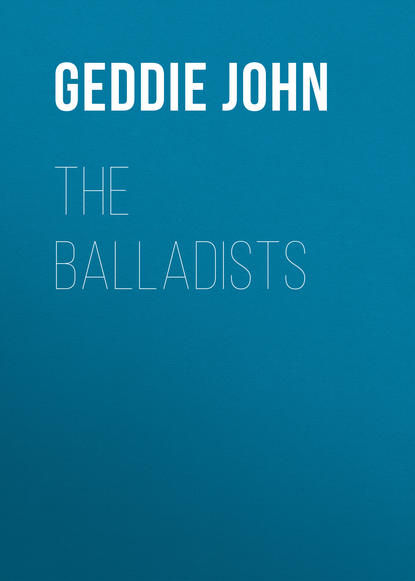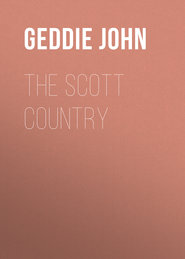По всем вопросам обращайтесь на: info@litportal.ru
(©) 2003-2024.
✖
The Balladists
Настройки чтения
Размер шрифта
Высота строк
Поля
An echo of this, but blending with poignant grief a masculine note of rage and vengeance, is the lament of Adam Fleming for Burd Helen, who dropped dead in his arms at their trysting-place in 'fair Kirkconnell Lea,' from the shot fired across the Kirtle by the hand of his jealous rival:
'O thinkna ye my heart was sair,
When my love drapt doun and spak nae mair!
There did she swoon wi' meikle care
On fair Kirkconnell Lea.
O Helen fair, beyond compare!
I 'll make a garland o' thy hair
Shall bind my heart for evermair
Until the day I dee.'
Still older, and not less sad and sweet, is the lilt of Willie Drowned in Yarrow, the theme amplified, but not improved, in Logan's lyric:
'O Willie 's fair and Willie 's rare,
And Willie wondrous bonnie;
And Willie hecht to marry me
If e'er he married ony.'
Gamrie, in Buchan, contends with the 'Dowie Howms' as the scene of this fragment; but surely its sentiment is pure Yarrow:
'She sought him east, she sought him west,
She sought him braid and narrow;
Syne in the cleaving o' a craig
She found him drowned in Yarrow.'
But best-remembered of the Yarrow Cycle is The Dowie Dens. One cannot analyse the subtle aroma of this flower of Yarrow ballads. In it the song of the river has been wedded to its story 'like perfect music unto noble words.' It is indeed the voice of Yarrow, chiding, imploring, lamenting; a voice 'most musical, most melancholy.' A ballad minstrel with a master-touch upon the chords of passion and pathos, with a feeling for dramatic intensity of effect that Nature herself must have taught him, must have left us these wondrous pictures of the quarrel, hot and sudden; of the challenge, fiercely given and accepted; of the appeal, so charged with wild forebodings of evil:
'"O stay at hame, my noble lord,
O stay at hame, my marrow!
My cruel kin will you betray
On the dowie howms o' Yarrow"';
of the treacherous ambuscade under Tinnis bank; of the stubborn fight, in which a single 'noble brand' holds its own against nine, until the cruel brother comes behind that comeliest knight and 'runs his body thorough'; of the yearning and waiting of the 'winsome marrow,' while fear clutches at her heart:
'"Yestreen I dreamed a doleful dream,
I fear there will be sorrow,
I dreamed I pu'ed the birk sae green
For my true love on Yarrow.
O gentle wind that blaweth south
Frae where my love repaireth,
Blaw me a kiss frae his dear mouth
And tell me how he fareth"';
lastly, of the quest 'the bonnie forest thorough,' until on the trampled den by Deucharswire, near Whitehope farmhouse, she finds the 'ten slain men,' and among them 'the fairest rose was ever cropped on Yarrow':
'She kissed his cheek, she kaimed his hair,
She searched his wounds a' thorough,
She kissed them till her lips grew red
On the dowie howms o' Yarrow.'
The story is said to be founded on the slaughter of Walter Scott of Oakwood, of the house of Thirlstane, by John Scott of Tushielaw, with whose sister Grizel the murdered man had, in 1616, contracted an irregular marriage, to the offence of her kin. On this showing, it is of the later crop of the ballads. But it is well-nigh impossible to think of rueful Yarrow flowing through her dens to any other measure than that which keeps repeating
'By strength of sorrow
The unconquerable strength of love.'
But, as Wordsworth reminds us, these ever-youthful waters have their gladsome notes. On the not unchallengeable ground that it makes mention, in one version, of 'St. Mary's' as the fourth Scots Kirk at which halt was made after leaving the English Border, The Gay Goshawk has been set down among the Yarrow ballads; and Hogg has confirmed the claim by using the tale as the foundation of his Flower of Yarrow. Even here such happiness as the lovers find comes by a perilous way past the very gates of the grave. The feigning of death, as the one means of escape from kinsfolk's ban to the arms of love, was a device known to Juliet and to other heroines of old plays and romances. But few could have abode the test suggested by the 'witch woman' or cruel stepmother, whose experience had taught her that 'much a lady young will do, her ain true love to win':
'"Tak' ye the burning lead,
And drap a drap on her white bosom
To try if she be dead."'
And Lord William, at St. Mary's Kirk, was more fortunate than Romeo in the vault of the Capulets; for when he rent the shroud from the face the blood rushed back to the cheeks and lips, 'like blood-draps in the snaw,' and the 'leeming e'en' laughed back into his own:
'"Gie me a chive o' your bread, my love,
And ae glass o' your wine,
For I hae fasted for your love
These weary lang days nine."'
The Nut-brown Bride and Fair Janet might also be identified as among the Yarrow lays, if only it were granted that there is but one 'St. Mary's Kirk.' In the former, the balladist treats, with dramatic fire and fine insight into the springs of action, the theme that
'To be wroth with those we love
Doth work like madness in the brain.'
As in Barbara Allan, a word spoken amiss sets division between two hearts that had beat as one:
'Lord Thomas spoke a word in jest,
Fair Annet took it ill.'
In haste he consults mother and brother whether he should marry the 'Nut-brown Maid, and let Fair Annet be,' and so long as they praise the tochered lass he scorns their counsel; he will not have 'a fat fadge by the fire.' But when his sister puts in a word for Annet his resentment blazes up anew; he will marry her dusky rival in despite. With a heart not less hot, we may be sure, his forsaken love dons her gayest robes, and at St. Mary's Kirk she casts the poor brown bride into the shade in dress as well as in looks. Small wonder if the bride speaks out with spite when her bridegroom reaches across her to lay a red rose on Annet's knee. The words between the two angry women are like rapier-thrusts, keen and aimed at the heart. 'Where did ye get the rose-water that maks your skin so white?' asks the bride; and when Annet's swift retort goes home, she can only respond with the long bodkin drawn from her hair. The word in jest costs the lives of three. Fair Janet's is another tragic wedding; love, and jealousy, and guilt again hold tryst in the little kirk whose grey walls are scarce to be traced on the green platform above the loch. 'I 've seen other days,' says the pale bride to her lost lover as he dances with her bridesmaiden:
'"I 've seen other days wi' you, Willie,
And so hae mony mae;
Ye would hae danced wi' me yoursel'
And let a' ithers gae"';
and, dancing, she drops dead.
Fasting, and fire, and sickness unto death were, however, tame ordeals compared with those which 'Burd Helen' came through, as they are described in the ballad Professor Child holds, not without reason, to have 'perhaps no superior' in our own or any other tongue. Patient Grizel, herself the incarnation in literary form of a type of woman's faithfulness and meek endurance of wrong that had floated long in mediæval tradition, might have shrunk from some of the cruel tasks which Lord Thomas – the 'Child Waters' of the favourite English variant – lays upon the mother of his unborn child – the woman whose self-surrender had been so complete that she has not the blessing of Holy Church and the support of wifely vows to comfort her in her hour of trial. All the summer day she runs by his bridle-rein until they come to the Water of Clyde, which 'Sweet Willie and May Margaret' also sought to ford on a similar errand:
'And he was never so courteous a knight,
As stand and bid her ride;
And she was never so poor a may,
As ask him for to bide.'
She stables his steed; she waits humbly at table as the little page-boy; she listens, her colour coming and going, to the mother's scorns and the young sister's naïve questions. But never, until the supreme moment of her distress, does she draw one sign of pity or relenting from her harsh lord. Then, indeed, love and remorse, as if they had been dammed back, break forth like a flood, that bursts the very door, and makes it 'in flinders flee.' And because our simple balladist bids us believe that the twain lived happily ever after.
'The marriage and the kirkin'






